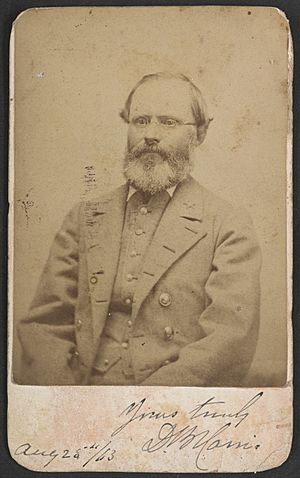David Bullock Harris facts for kids
Quick facts for kids
David Bullock Harris
|
|
|---|---|

David Bullock Harris in 1863
|
|
| Born | September 8, 1814 Louisa County, Virginia |
| Died | October 10, 1864 (aged 50) Summerville, South Carolina |
| Buried | |
| Allegiance | United States of America Confederate States of America |
| Service/ |
United States Army Confederate States Army |
| Years of service | 1833–1835 (USA) 1861–1864 (CSA) |
| Rank | |
| Unit | 1st U.S. Artillery |
| Battles/wars | American Civil War |
David Bullock Harris (September 28, 1814 – October 10, 1864) was an important colonel in the Confederate States Army during the American Civil War. He was a skilled engineer. Harris mostly worked under General P. G. T. Beauregard. He designed and built many defenses for the Confederate side. These included defenses at Centreville, Virginia, Fort Pillow, Island Number Ten, Vicksburg, Mississippi, Charleston, South Carolina, and Petersburg, Virginia. He passed away from yellow fever in Summerville, South Carolina, in October 1864.
Early Life and Education
David Bullock Harris was born on September 28, 1814. His birthplace was Frederick's Hall in Louisa County, Virginia. He grew up nearby at Gardner's Crossroads. His parents were Frederick and Catherine Snelson (Smith) Harris. His father was a captain in the U.S. Army during the War of 1812. Later, his father led the Louisa Railroad.
David Harris went to the United States Military Academy. He graduated in 1833. For two years, he served in the U.S. Army's artillery branch. He also taught engineering at West Point. In 1835, he left the U.S. Army as a second lieutenant.
After leaving the army, Harris worked as an engineer. He helped build the James River and Kanawha Canal. He also surveyed land for railroads. By 1845, he owned a large farm called "Woodville" in Goochland County, Virginia. He lived there when the Civil War began. Harris was married to Louisa Knight.
Role in the American Civil War
When the Civil War started, David Bullock Harris joined the Virginia militia. He became a captain of engineers on May 2, 1861. Soon after, he worked with Confederate General Philip St. George Cocke. He was involved in the First Battle of Bull Run in July 1861. After this, Harris joined the staff of General P. G. T. Beauregard.
Harris became known for his engineering skills. He planned many important Confederate defenses. These included strongholds at Centreville, Fort Pillow, Island Number Ten, Vicksburg, and Charleston. He received several promotions for his work. He became a captain of Confederate engineers in February 1862. Then he was promoted to major in October 1862. He became a lieutenant colonel in May 1863 and a colonel in October 1863.
When General Beauregard took command in Charleston again, Harris worked hard. He constantly improved the city's defenses. He often visited dangerous areas to design better fortifications. These defenses were so strong that Union forces found them very difficult to attack. Later, Harris traveled with Beauregard to Virginia. There, he planned defenses for Petersburg in the summer of 1864.
Harris returned to Charleston as the chief engineer. However, he soon became ill with yellow fever. He passed away at Summerville, South Carolina, on October 10, 1864. He had just turned 50 years old.
Aftermath
Before he died, David Bullock Harris was recommended for another promotion. He was to become a brigadier general. Confederate President Jefferson Davis even promised him this promotion. However, the official paperwork was not completed before Harris passed away. Because of this, the promotion never officially went through.
David Bullock Harris is buried in Hollywood Cemetery (Richmond, Virginia).
 | Delilah Pierce |
 | Gordon Parks |
 | Augusta Savage |
 | Charles Ethan Porter |

